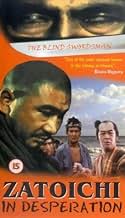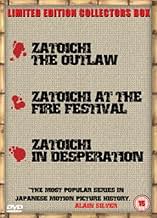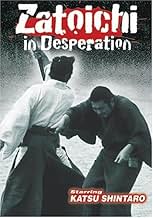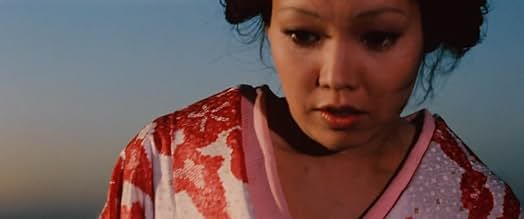IMDb रेटिंग
6.8/10
1.2 हज़ार
आपकी रेटिंग
अपनी भाषा में प्लॉट जोड़ेंAfter accidentally causing an old lady's death, Zatoichi seeks out her daughter to atone for the tragedy, consequently getting into all sorts of trouble.After accidentally causing an old lady's death, Zatoichi seeks out her daughter to atone for the tragedy, consequently getting into all sorts of trouble.After accidentally causing an old lady's death, Zatoichi seeks out her daughter to atone for the tragedy, consequently getting into all sorts of trouble.
- निर्देशक
- लेखक
- स्टार
फ़ीचर्ड समीक्षाएं
Katsu Productions was at a high level of output at this time. Katsu was producing the Zatoichi series, the Lone Wolf series, the Hanzo the Razor trilogy, the Mute Samurai television series and the Lone Wolf television series. All within a span of two years. In addition to acting in several of these efforts (of course) he also took the director's chair on several occasions. This man had a lot of energy.
While sometimes actors who take the helm show a lack of concern with the visuals preferring to focus on the performances, Katsu is an exception. The visual style here is unlike any other Zatoichi I've seen and in fact unlike most other chambara films. Everything is shot in deep focus with moody lighting and stark saturated colors. The style is somber and depressing. The next (and last in the series) Zatoichi film is back to the standard look. If you like this film I would suggest looking into Katsu's Oshi Samurai series which continues the atmosphere.
One of the best Zatoichi films but not similar to the others. Recommended but prepare for a somber experience.
While sometimes actors who take the helm show a lack of concern with the visuals preferring to focus on the performances, Katsu is an exception. The visual style here is unlike any other Zatoichi I've seen and in fact unlike most other chambara films. Everything is shot in deep focus with moody lighting and stark saturated colors. The style is somber and depressing. The next (and last in the series) Zatoichi film is back to the standard look. If you like this film I would suggest looking into Katsu's Oshi Samurai series which continues the atmosphere.
One of the best Zatoichi films but not similar to the others. Recommended but prepare for a somber experience.
The following review is an extract from the book "Shintaro Katsu´s Zatoichi: Complete guide to all movies", which is now available on Amazon.
Zatoichi crosses a bridge with a woman who plays the shamisen. The old woman warns him to be careful, for the wood of the bridge has holes, and it is easy to fall if one does not pay attention. The two talk briefly, and the lady asks the blind man where he is going. "Nowhere in particular, wherever the wind takes me", replies the wandering masseur. The old woman replies that she intends to visit her daughter, who works in a geisha house called Ogiya in a nearby town. Moments after they have said goodbye, the blind man has the idea of offering some coins to the old woman, as a tip for playing the shamisen so well... The grateful woman is about to take the coins, but distracted by the surprising gift, slips, loses her balance and falls into the void... She, who had recommended to the blind man to be very careful.
Zatoichi feels guilty for the deadly accident of the poor woman. Unlike its owner, the instrument has remained on the bridge and the masseur picks it up. With the shamisen he walks towards the city of which the deceased spoke to him, to look for his daughter, the geisha, in Ogiya.
(...)
This, the 24th and penultimate, is one of the two films in the saga directed by actor Shintaro Katsu himself, who also acted as co-producer. The other, also directed by Katsu, is the last of the originals (called "Zatoichi" just like that), which was filmed many years later - in 1989 - and where you can see an already grayed and almost old Ichi.
"Zatoichi in desperation", as its title already indicates, is fraught with deep pessimism. Oppressive and dark, sad, depressing and hopeless. Tragically and emotionally brutal.
It also has an undeniable poetic undertone.
Zatoichi crosses a bridge with a woman who plays the shamisen. The old woman warns him to be careful, for the wood of the bridge has holes, and it is easy to fall if one does not pay attention. The two talk briefly, and the lady asks the blind man where he is going. "Nowhere in particular, wherever the wind takes me", replies the wandering masseur. The old woman replies that she intends to visit her daughter, who works in a geisha house called Ogiya in a nearby town. Moments after they have said goodbye, the blind man has the idea of offering some coins to the old woman, as a tip for playing the shamisen so well... The grateful woman is about to take the coins, but distracted by the surprising gift, slips, loses her balance and falls into the void... She, who had recommended to the blind man to be very careful.
Zatoichi feels guilty for the deadly accident of the poor woman. Unlike its owner, the instrument has remained on the bridge and the masseur picks it up. With the shamisen he walks towards the city of which the deceased spoke to him, to look for his daughter, the geisha, in Ogiya.
(...)
This, the 24th and penultimate, is one of the two films in the saga directed by actor Shintaro Katsu himself, who also acted as co-producer. The other, also directed by Katsu, is the last of the originals (called "Zatoichi" just like that), which was filmed many years later - in 1989 - and where you can see an already grayed and almost old Ichi.
"Zatoichi in desperation", as its title already indicates, is fraught with deep pessimism. Oppressive and dark, sad, depressing and hopeless. Tragically and emotionally brutal.
It also has an undeniable poetic undertone.
This is the best one, number 24. Ichi realizes that he is not a hero, is making everyone's lives ultimately more violent and difficult than it would have without his existence. He is physically punished for this and still dispatches 20 dudes without using his hands.
If you don't like mean people, you know, actually effective villains, this one might make your little sensitivities buzz. The moral philosophy Katsu evaluates is artful and considerate. This is a brutal, dark, and ballsy entry.
If you don't like mean people, you know, actually effective villains, this one might make your little sensitivities buzz. The moral philosophy Katsu evaluates is artful and considerate. This is a brutal, dark, and ballsy entry.
I have not seen more than five of the classic (and undeniably classy) Zatoichi samurai films, but this is surely the best, cinematographically, so far. It;s hard to believe this was shot in Eastman Color, a kind of poor second to Technicolor (and with far less durability; either the negative was especially preserved, or digital restoration was performed by a true expert; but in any event, this film is absolutely gorgeous to look at.
The story is dark, as others have noted; but the Zatoichi series, like most of the sword-fight genre series films to come out of Japan, is pretty heavy-handed stuff; the Japanese seem to take this sort of thing very seriously. Yet there is no doubt Zatoichi "24" stands out as exceptional, from both the series and its genre. The reason, I think, is its almost total sense of social dislocation; Zatoichi is treated by the other characters as somehow less than human, and his determination to fight at the end somewhat more than human, and so he comes across as something other than human; but the other humans of the film come across as rather poor representatives of the species. I should note that there is very little dialog in this film, particularly at the most dramatic moments, which heightens our sense that we are watching some tragedy from another reality.
The question here is, has director/star Katsu pushed his character to such an extreme that he is no longer representative of his genre, but somehow an independent dramatic entity, a "grade-A film", as might be enjoyed by those who disdain genre-films? well, I suggest this film to such viewers, as the "one chambara (Japanese sword-fight)film to see". But in any event, it is an exceptional, and troubling, cinema experience for anyone.
The story is dark, as others have noted; but the Zatoichi series, like most of the sword-fight genre series films to come out of Japan, is pretty heavy-handed stuff; the Japanese seem to take this sort of thing very seriously. Yet there is no doubt Zatoichi "24" stands out as exceptional, from both the series and its genre. The reason, I think, is its almost total sense of social dislocation; Zatoichi is treated by the other characters as somehow less than human, and his determination to fight at the end somewhat more than human, and so he comes across as something other than human; but the other humans of the film come across as rather poor representatives of the species. I should note that there is very little dialog in this film, particularly at the most dramatic moments, which heightens our sense that we are watching some tragedy from another reality.
The question here is, has director/star Katsu pushed his character to such an extreme that he is no longer representative of his genre, but somehow an independent dramatic entity, a "grade-A film", as might be enjoyed by those who disdain genre-films? well, I suggest this film to such viewers, as the "one chambara (Japanese sword-fight)film to see". But in any event, it is an exceptional, and troubling, cinema experience for anyone.
'Zatoichi In Desperation' was the 24th movie in the long running and very popular martial arts series starring Shintaro Katsu as Zatoichi the blind master swordsman and masseur. Zatoichi, for those that don't know is a ronin (a wandering samurai), very quiet and unassuming with a wry sense of humour, but an absolute killing machine when crossed! In this episode he encounters an old woman while crossing a bridge, and after a brief conversation with her, she tragically falls to her death. Upset, Zatoichi sets off to a nearby town to look for the woman's daughter Nishikigi to break the news to her. He eventually finds her working as a geisha and learns she only needs to pay a debt of fifty ryo to buy her freedom. Zatoichi becomes obsessed with raising the money and in doing so ignores the hardships experienced by the local fisherman caused by the local evil boss Mangoro. But when Mangoro kidnaps Nishikigi everything comes to a head in a brutal climax, and Zatoichi must save her and his own life. I can't claim to be any kind of Zatoichi expert, but he's a most intriguing character, and Katsu plays the role masterfully. I highly recommend 'Zatoichi In Desperation'.
क्या आपको पता है
- ट्रिवियाOnly film in the original series directed by Zatoichi himself, Shintarô Katsu. He would go on to direct one more, Zatôichi (1989).
- भाव
Boss Mangoro Kagiya: Please enjoy watching as Zatoichi meets his end.
- कनेक्शनFollowed by Mang jian xue di zi (1973)
टॉप पसंद
रेटिंग देने के लिए साइन-इन करें और वैयक्तिकृत सुझावों के लिए वॉचलिस्ट करें
- How long is Zatoichi in Desperation?Alexa द्वारा संचालित
विवरण
- रिलीज़ की तारीख़
- कंट्री ऑफ़ ओरिजिन
- भाषा
- इस रूप में भी जाना जाता है
- Zatoichi in Desperation
- उत्पादन कंपनियां
- IMDbPro पर और कंपनी क्रेडिट देखें
- चलने की अवधि1 घंटा 35 मिनट
- ध्वनि मिश्रण
- पक्ष अनुपात
- 2.35 : 1
इस पेज में योगदान दें
किसी बदलाव का सुझाव दें या अनुपलब्ध कॉन्टेंट जोड़ें

टॉप गैप
By what name was Shin Zatôichi monogatari: Oreta tsue (1972) officially released in India in English?
जवाब





























